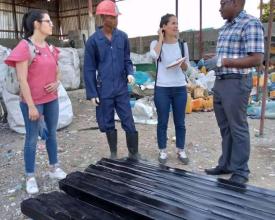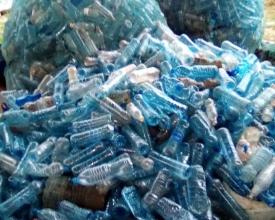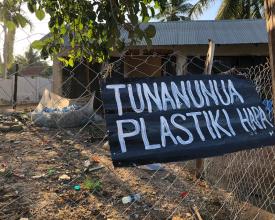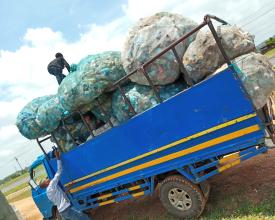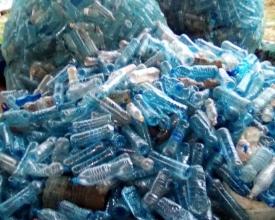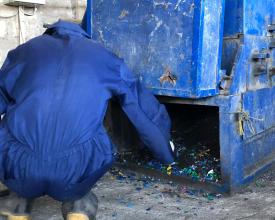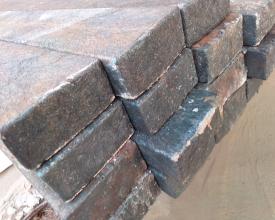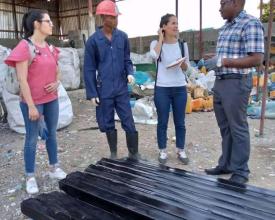
EcoAct Tanzania Green Life
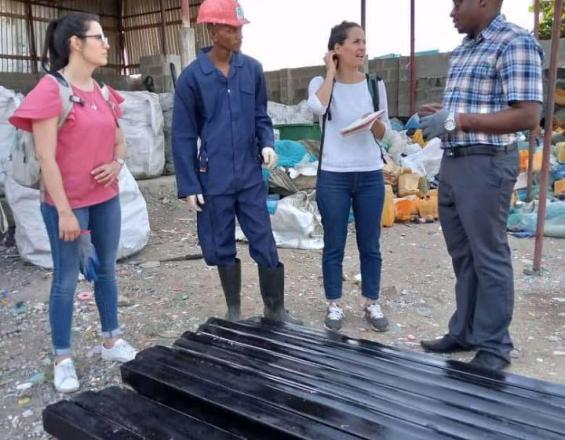
EcoAct Tanzania is a social enterprise established in 2018 to address the challenges of plastic pollution in coastal ecosystems. EcoAct uses chemical-free and energy-conserving plastic extrusion technology called "Waxy ıı Technology" to recycle and transform post-consumer plastics, packaging materials, and agricultural waste into durable and environmentally friendly plastic lumbers. Plastic lumbers are an affordable alternative to wood timbers, that reduce the need for building material manufactured from wood. Plastic lumbers made from recycled waste plastics and agricultural waste is an ideal product for construction building and furniture making. This product helps to preserve coastal forests like mangroves used in the construction of beach hotels, to cut down on deforestation rates, and to mitigate climate change. Also, they create sustainable jobs by manufacturing and selling eco-friendly quality building products that exceed the expectations of customers.
Context
Challenges addressed
Plenty of solid waste can be found everywhere within the city and around homes, of which 38% is plastic. While both the local administrators and environmental legal bodies understand the health risks involved, the lack of financial and technological capability has left the city residents grasping for help. Landfill and burning is the most common method used in Dar-es-Salaam. On the other hand, the growing demand for timber in building and construction activities is putting a lot of pressure on the country’s forests (Tanzania loses 300,000 to 400,000 hectares of forest every year). EcoAct realized that if only they could produce an alternative product to timber that was strong, longer-lasting, cheaper, and environmentally sustainable, they could profit from the profitable timber market while helping to save Tanzania’s forests.
Location
Process
Summary of the process
Employing innovative environmentally friendly solutions saves the environment from deforestation, pollution, and climate change while creating sustainable jobs by manufacturing and selling eco-friendly quality building products that exceed the expectations of customers. All these are achieved through a strong working team, formulating a 5-year strategic plan and, establishing partnerships with key stakeholders working in the sector.
Building Blocks
Woodworking technology
An innovative, chemical-free, and less energy consumption technology to recycle and transform post-consumer plastic waste into affordable and durable plastic lumbers which are an alternative to expensive timber to ensure a cleaner and healthier environment while reducing effects of climate change, deforestation rates, and giving better margin to our customers.
Enabling factors
At first, our poles after being exposed to sunlight were giving off the bad smell which made our customer complain. After going through some studies to understand the causes of the bad smell we shifted our practices and tried some other materials. In our trials, we realized that much agricultural waste like maize and coconut husks were useful to offset the smell. However, one was producing smooth and clean products, and another one produced scratchy products. So we selected the best receipt.
Lesson learned
When we started we were using all kinds of plastics including PVC without knowing that they were made of additional chemicals. During our operations, we realized that some plastics were emitting harmful fumes when burnt which caused difficulty in breathing. We twisted our technology into organic manure and stopped using PVC and other plastics that are producing fumes. We used organic manure and things like sawdust in our formula but the problem was still there. We discovered that by adding agricultural waste in the mix of plastics we produce clean products and fumes are reduced.
Resources
Build and maintain strong team spirit
In order to clean up the city of its plastic waste, we have established a stable and profitable company and tackle the problem of waste pollution at the point of generation by attaching social, environmental, and economic value to plastic waste. We collect waste plastics from the streets and landfills, we also allow the community to exchange their waste plastics with medical insurance coverage, this helps us to collect enough waste plastics to manufacture plastic lumbers, this has helped us a lot to change the community’s attitude towards waste management.
Enabling factors
EcoAct has simplified everything through socializing, doing factory parties where all factory workers participate and this makes them feel part of the company. Every Monday at the meeting there must be a representative of factory workers whom they elect to present the opinions to the management. We meet, discuss and consult and sometimes we give ourselves challenges to stay creative and design new and unique products. This enables them to participate in making the decisions.
Lesson learned
When I was a fresh graduate I used to think that if you work for any company you are just a person to be instructed to do this and do that. When I got to EcoAct, things were different. There is no one to direct me on what to do. I personally just think about what to do before I am told what to do. So what I have learned is that you have to think a lot and you can't think alone. We, the staff are the ones who have to think before we are given orders.
Provide social incentives
The Garbage Medical Insurance program is a micro health insurance program that uses garbage as a financial resource. With this program, the community and unensured poor slum dwellers are able to pay for health cover, drugs, and other clinical services by using garbage as payment to an insurance scheme. This, in turn, improves their access to medical treatment and the quality of public health programs with respect to promotive, preventive, curative, and rehabilitative well-being mainly targeting slum children below 5 years and expectant women. It further offers the community an incentive to start organized waste management and waste entrepreneurship system from the household level so as to benefit from continual health insurance.
Enabling factors
What really enabled us was the constant lack of plastic waste supplies from households benefiting from our medical insurance scheme. They themselves said there was a challenge that other people were coming to buy plastics so they had to sell. This made the collection of plastic waste too costly because every time we go to collect our garbage from the families we provide insurance we don't get it. The increase in cost was due to the hiring of a car to carry the garbage.
Lesson learned
At first, we thought that people were in need of medical insurance and the challenge was getting money to pay for it. So we knew that once we provide insurance we have solved health problems but still people wanted insurance and cash money which is difficult for the company given the high cost of medical insurance. We offered medical insurance at the family level in exchange for plastic waste. Because people already had insurance and wanted cash money they were selling plastics to other people and we could not get our plastic supplies on time. In order to overcome these challenges, we pay for any extra amount exceeding the monthly rate so as to make one earns some money. The demand is too high, if there are people who can venture into that we would appreciate it.
Impacts
EcoAct has collected about 20 tons of plastic and made 700 plastic lumbers which have all been sold to hotels in Zanzibar and Arusha, thereby generating income. Many truck drivers earn income by renting out their cars to EcoAct to collect plastic waste from designated centers. Also, EcoAct has a three years strategic plan that ensures the withdraw of over 2.5 million kilograms of post-consumer waste plastic from the environment and use them to manufacture plastic lumbers hence save an estimated 250 acres of forest that would have been cut. At the same time, it prevents 2,500 Tons of Carbon dioxide gas emissions to further mitigate climate change and has created 300 direct jobs. EcoAct has provided medical insurance to 100 households in slums located in Tegeta (along Tegeta river which empty to the Indian Ocean) and Goba targeting family members (fathers, mother, and three children). In return, households collect three kilograms of plastics from the garbage they produce at home every week. The program offers the community an incentive to start organized waste management and waste entrepreneurship system from the household level so as to benefit from continual health insurance. EcoAct is buying plastic flakes from other people who own crashing centers in different regions thereby on average collecting 50 tons of plastic per month.
Beneficiaries
Local communities receiving medical insurance in exchange for their waste plastics and those employed directly and indirectly by the company. For example, waste pickers, transporters and temporary employment of graduates to market our products.
Sustainable Development Goals
Story
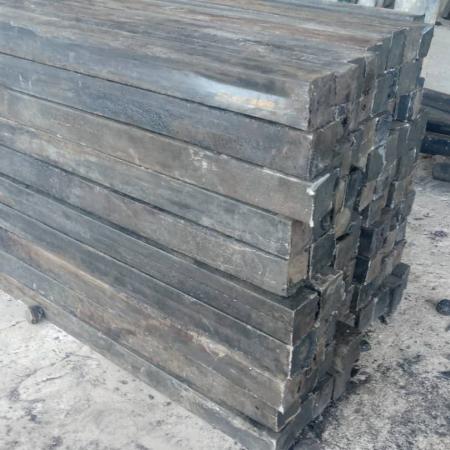
The idea of establishing EcoAct came from the desire to clean up the environment. In the beginning, we collected plastics waste and piled them up until when they were plenty we would sell them to the Chinese. Since it was hard for us to go in the field to pick up the waste, we decided to set up centers for collecting the plastics and started buying from waste pickers as much as one ton every two weeks. But plastic bottles are difficult to collect one ton because they require a lot of space in the storage area. So it was easy to collect buckets, jars, and send them to the Chinese. However, the challenge came that the Chinese were setting a price and they too were buying from waste pickers. This situation brought challenges in terms of pricing. Since the idea was to deal with environmental issues we continued, but sometimes our collections were stolen because control was difficult. And this is because some of the waste pickers were selling to us the same waste stolen from our centers. So in order to have more control we had to make things ourselves. We had seen plastic boards at Kenya EcoPost in 2008/9 they were making poles. Investment became difficult because it needed money. Later, we managed to solicit funds from different sources and we bought a small plastic grinding machine and started selling plastic flakes to the Chinese. Therefore, instead of selling plastics that had a low price, we started selling plastic flakes with added value. In 2018 the price of HDPE was TZS 1200/kg at Chinese factory but TZS 800/kg in streets. At that time the price was high because they were used to make plastic bags that were banned by the government in 2019. HDPPs which are hard drums used to make bags were sold at TZS 900-1000/kg and the street price was TZS 600-650/kg. These bags had no market like plastic bags because they were big as compared to single-use plastic bags. In June 2019, the government made a ban on single-use plastic bags thus, there was no one to buy plastics. Following the plastic ban, we had to make a decision either to close the company or continue with our idea of making poles, but the challenge was that machines were expensive. While we were in the grinding business we saved money to buy an extruder machine. We bought an extruder machine but operations were difficult because of a lack of expertise. Sometimes we were producing curved or cracked poles. Since then we have been learning and we adopted the woodworking technology from Kenya.

